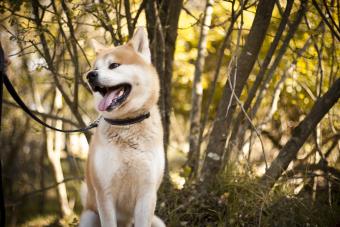Most Challenging Breeds to Train

All dogs are trainable, but some breeds require a lot of patience and consistency on the part of their owners. They're also likely to develop bad habits if you don't maintain your training schedule and make sure that you're reinforcing your commands consistently. Check out the most difficult dogs to train and see if your pup made the list!
Cairn Terrier

Cairn Terriers are known for their feisty personality and stubbornness. They are very intelligent dogs and will learn commands quickly, but they will test you to make sure you mean it. Cairns need a persistent owner who is confident and assertive to help deal with their distracted nature and willful desire to do their own thing.
The Cairn Terrier has been ranked as one of the top 20 most intelligent dog breeds in the world by Stanley Coren's The Intelligence of Dogs.
Australian Shepherd

The Australian Shepherd is hard to train due to their strong personality and stubborn disposition. It isn't that Australian Shepherds aren't smart - they're super smart - or that they don't enjoy training. The difficulty with this breed is that just keeping up with them is a challenge. They are hyper focused, but they also require frequent engagement. If you can work with them consistently - like every day - you'll have success.
Herding breeds - including the Australian Shepherd - are thought to be among the most intelligent dogs.
Alaskan Malamute

Alaskan Malamutes are very intelligent dogs who need stimulation in order to stay happy and healthy. They do not do well if left alone for long periods and get bored easily. Alaskan Malamutes are easily distracted when not engaged, very intelligent, and stubborn, to boot. You'll need to be very patient and consistent when training this breed.
If you get an Alaskan Malamute puppy from a breeder who has socialized them from an early age, your puppy will have fewer problems adjusting to training and social situations.
Chow Chow

The Chow Chow is not a breed for everyone. They can be willful, independent, and difficult to train. Chow Chows need a consistent, determined trainer to deal with their stubborn streak and single-mindedness.
Chow Chows do not always make good pets for homes with children. They can be territorial and distrustful of strangers.
Great Pyrenees

The Great Pyrenees is an extremely intelligent dog. Their low interest in pleasing their pet parent makes them very hard to train. They have their own way of doing things, and they don't always listen to their owners. Great Pyrenees are strong-willed and because they are larger than other breeds, trainers have to be ready to make adjustments and work to keep them engaged.
Great Pyrenees were bred as livestock guardians, and were required to be independent thinkers who can assess dangers when their trainers aren't around. Because of this, they aren't as eager to please as some other breeds.
Greyhound

Greyhounds are gentle dogs but they can also be stubborn and difficult to train. This is because they have been bred for thousands of years to track and chase prey, so their instinct is to chase anything that moves. Greyhounds are natural athletes, and need lots of engagement and activity to stay healthy and focused.
Former racing greyhounds who are rescued can display some difficult behaviors, and special care and attention are needed to help them overcome these challenges.
Weimaraner

The Weimaraner has been described as having a highly developed sense of independence. This breed is known for not being overly obedient or submissive, which can make training a challenge. You'll need to give them plenty of love, attention, and enrichment to overcome their curious nature, need for activity, and stubborn tendencies.
Weimaraners can become hyperactive if they aren't getting enough exercise, or if they get bored. Plan to give your pup daily exercise and opportunities for play.
Siberian Husky

The Siberian Husky is a working dog, bred to pull sleds through the coldest regions of the world. They have a tendency to be stubborn and willful, which means that training them can be challenging. Siberian Huskys are also well-tuned athletes who need very high levels of exercise, so if you aren't ready for daily workouts and consistent training, consider another breed.
Siberian Huskys are highly social - they were bred to run in sled teams - and display pack behaviors, which means they may not do as well when they don't have social engagement.
Basset Hound

Basset Hounds are notoriously stubborn, independent, and not particularly eager to please. They're also easily distracted, and don't pay as much attention to training commands. Basset Hounds have strong hunting instincts, which leads them to do what they want, when they want. Trainers need a lot of patience and consistent methods to be successful with this breed.
Basset Hounds are notorious for being difficult to house train because they like to mark their territory by urinating throughout the house.
Sign up for our newsletter featuring all the latest stories and products we love.
Akita

Akitas are hard to train because they have a strong independent streak and they don't always take well to discipline. They can be stubborn and pushy, and while Akitas love their people and want to please them, they have a tendency to get bored easily. They also like to be in charge, so if you're not firm with your commands and corrections, they'll take over.
Akitas are somewhat more prone to aggressive behavior, and are not known for their trainability.
Jack Russell Terrier

Jack Russell Terriers are a very intelligent breed, but they are also famously stubborn and independent. These headstrong dogs do things their own way, even if that means disobeying their owners. This can make training Jack Russels a challenge because they tend to be distracted and ignore commands that they don't like.
Jack Russells can be prone to deafness, which means they might not be ignoring you. They just might not be able to hear your commands.
Positive Reinforcement Is Crucial

Although these breeds are among the most difficult to train, it's important to never scold or punish your dog when they don't listen to you. Instead, use positive reinforcement methods that rely on rewards to encourage desired behaviors. Build your bond, stay consistent with your training, and keep these dogs well-exercised and engaged, and you can successfully train even the most demanding breeds.







